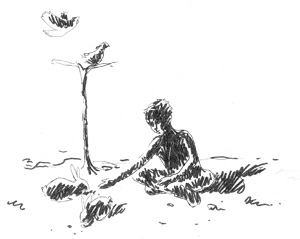
Let’s start a trip between the farming operations in the vineyards & the fermentation operations in the winery. Gaio (=Joy; my father when he was young) will explain us how he’s been doing these operations since fifty years ago under the control of his father and his grand-parents (the centenarian)
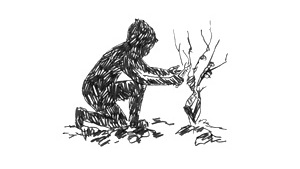
Gaio-child prunes
the vineyards without leaves is pruned between December & February. Old branches are pruned keeping only young branches. Old “alberelli” (=little trees) are pruned “a spalla” (Etna ancient method). New vineyards use Guyot. Our system allows us low quantity of grapes and a good ratio grapes/leaves without doing another thinning.
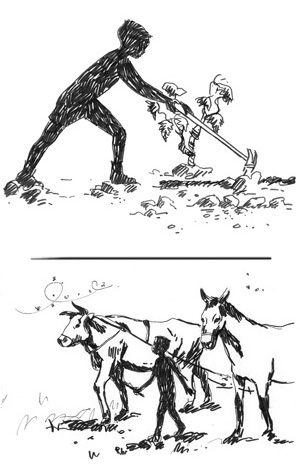
Gaio-child who hoes - Gaio-child with ox and mule
airing the vineyards improves the cultivation, keeps the water under the land and lets live microorganisms in the soil. Hoeing by hand, weeding, plowing, spading are important operations made a lot of times during the year. The vineyards have many stones and are difficult to be worked. In ancient times oxen or mules were needed, horses were used rarely. Today the tractors and cultivators help us, we need only to choose the moment with care and if superficial or deep operations are needed, but the finish by hand is irreplaceable.
We have old farming instruments, the harnesses for the animals and the lava stalls with manger. We have also a “mannora” (stall) for sheep and goats. Once animals gave the compost for the natural manure that in some period was given.
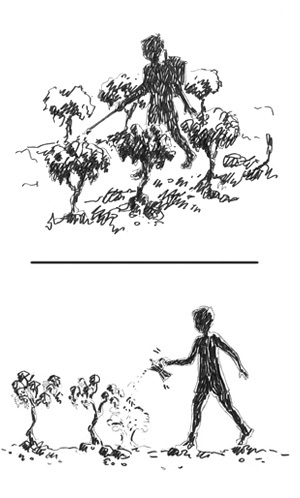
Gaio-child who gives sulfur with “Italian coffeepot” & cuprum with “hand pump”
Phylloxera, powdery mildew & downy mildew are three pathologies due to mites or fungus originated from the Americas at the time in which steamships shortened sea lanes and avoided “natural quarantine” replacing sailing ships and their equatorial sea lanes.
Night cold & volcanic land gives Etna an unsuitable habitat for phylloxera and allows the life of many ungrafted vines. So we have the possibility to plant new ungrafted vines again! Old vineyards selection of grapes and no American root are present in 50% of our new planting.
Powdery mildew is a fungus who affects the leaves curling them till falling and in worst cases ruining the grapes. On Etna from generations we use sulfur given with an “Italian coffeepot”! Better on land and not on leaves! Only Nerello Cappuccio suffers a lot of this fungus, other vines suffer less.
Downy mildew affects the leaves (who necrotize and fall), the buds and bunches (who dry up) and hits after the rain… the three 10 rule tells us that downy mildew needs 10 mm of rain, 10°C of temperature and 10 cm of length of buds. We always pay attention and often love to protect out vineyards giving low quantity of cuprum… once farmers gave cuprum through a hand lance with a tank on the shoulders.
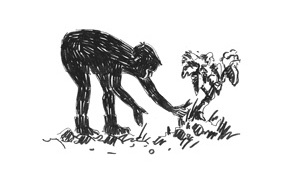
Gaio-child cuts the grass
in the summer grass goes in competition with the vines for the water… we love only to cut the grass in excess. This operation is made by hand, by hoe and with a patented tipping machine who don’t cut the wood part of the vines. Taking care about vines is the secret, controlling his vegetative cycle and avoiding his pain.
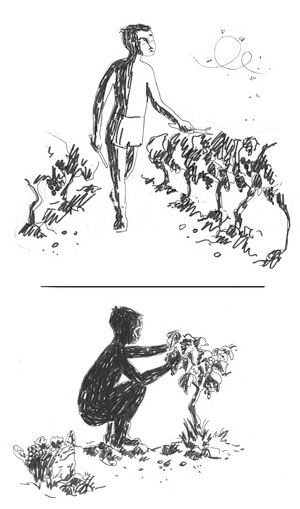
Gaio-child feels the moment of harvest - Gaio-child cuts the grapes in the harvest
once Gaio-child feels the moment of the harvest by the smell of vineyards and by the buzz of hornets and wasps. Today we does analysis in the harvest, but daily technique corresponds always with ancient empiric way. The harvest starts usually in the mid of October. The grapes are cut by hand and placed in small baskets. We take care not to crash the grapes for their integrity.
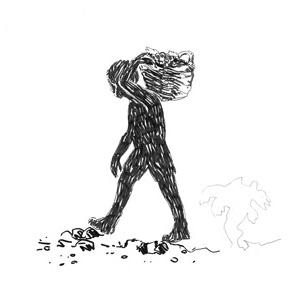
Gaio-child brings the grapes in the winery
grapes are brought immediately in the winery to be destemmed and then crushed. Once the small baskets were a product of local “artigianato” (handicraft).
The baskets were picked up by shoulder and brought to lava milestone. Because of the lack of roads there were handreds of little “palmenti” in the vineyards that were crowded of man in October. If you come to visit us you can ask us to visit them. That’s a beautiful experience of Industrial Archeology.
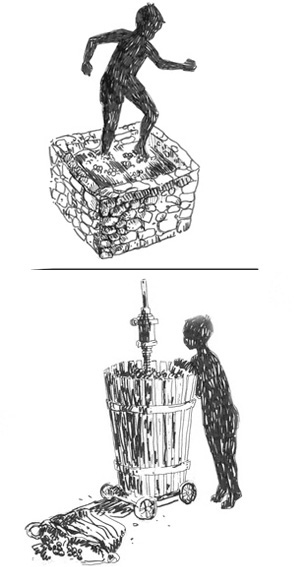
Gaio-child who crushes - Gaio-child with winepress
once grapes were crushed with foot in ancient lava milestone. The songs of men got partnership with this important transformation in a party environment. We don’t love the stems in the fermentation, because we can have green tannins in the wine. We usually have green stems in the harvest moment. Small barrel to ferment, short macerations and delicate crushing gave us the possibility of a beautiful dissolution of color and substance. We love indigenous yeasts, but this is a natural result of our manage of vineyards marked to low use of sulfur and copper. Our fermentations follow experience and are thought and experimented with care according with the vine, age & vintage
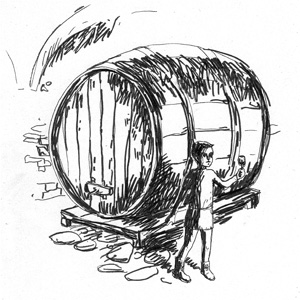
Gaio & the big oak barrel
waiting for patiently… the aging allows to a wine to increase & to become ready to drink. After a natural malolactic fermentation, the wine comes down into big oak barrel (or barrique for little quantity of wine) in the underground cellar. Here during his aging the cool temperature, the hygrometric conditions and the oak transpiration let the wines to fix the color, to soft the tannins, to fall substances by precipitation & to work fine lees; in short let the wine to express himself and the vintage.
A lot of tasting, often with the visiting clients, let us follwing the track till its conclusion, who changes with the grape, the climax / contrada and the vintage.
Underground cellar allows unique & un repeatable climatic conditions.
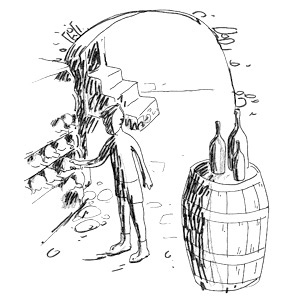
Gaio with the bottles
… if you think aging finishes in oak, well you think bad ! Once wine is ready, he goes to bottle. Low quantity of Sulfur added allows a little safety without compromise drinkability & pleasure.
CO2 (carbon dioxide) let us to minimize the number of bottle with cork scent… but in reality a new track starts for the just bottled wine: glass aging. It is very important for the evolution of a wine and we usually try to control this passage before selling the wine.